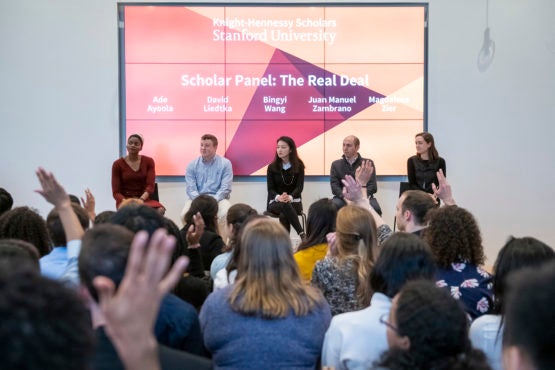Knight-Hennessy Scholars program at Stanford announces second global cohort
The Knight-Hennessy Scholars program has announced its 2019 cohort, which includes citizens of 20 countries.
The Knight-Hennessy Scholars program has announced 69 students from around the world for its second cohort of scholars. Knight-Hennessy Scholars receive full funding for graduate study at Stanford. The final cohort profile will be available after May 1.

Five of the current 2018 Knight-Hennessy scholars answer questions for the 2019 finalists during Immersion Weekend. From left are Ade Ayoola, David Liedtka, Bingyi Wang, Juan Manuel Zambrano and Magdalene Zier. (Image credit: L.A. Cicero)
The 2019 Knight-Hennessy Scholars will pursue graduate degrees across the university at all seven of Stanford’s schools, with 27 percent earning degrees in Humanities and Sciences; 20 percent in Medicine; 19 percent in Engineering; 17 percent in Law; 12 percent in Business; 4 percent in Education; and 1 percent in Earth, Energy and Environmental Sciences.
The program aims to develop an interdisciplinary community of future global leaders to address the world’s most complex challenges through collaboration and innovation.
“We are impressed and humbled by what this new cohort of scholars has already achieved and inspired by their deeply rooted commitment to effect positive and lasting change in the world,” said John L. Hennessy, the Shriram Family Director of the Knight-Hennessy Scholars program.
While all of the 2019 Knight-Hennessy Scholars have been admitted by graduate programs at Stanford, the students have until standard departmental deadlines in April to accept admission offers. Short profiles of students who have indicated their tentative plans to become Knight-Hennessy Scholars can be found here.
Early look at second cohort
This year, the Knight-Hennessy Scholars program received 4,424 applications, an increase of 23 percent from 2018. The primary selection criteria used to evaluate applicants were independence of thought, purposeful leadership and a civic mindset.
A provisional profile of the 2019 Knight-Hennessy Scholars is as follows:
- 52 percent are men and 48 percent are women.
- 35 percent are pursuing doctoral degrees, 22 percent are pursuing master’s degrees and 43 percent are pursuing professional degrees.
- Among the 30 percent of international scholars in the cohort are students with passports from 19 countries (11 of which were not represented in the 2018 cohort): Cambodia, Canada, Chile, China, Egypt, Eritrea, Ethiopia, Germany, India, Ireland, Kenya, Lebanon, Malaysia, New Zealand, Nigeria, Pakistan, the Philippines, United Kingdom and Zimbabwe.
- The scholars earned undergraduate degrees at 15 international and 37 U.S. institutions (including 35 institutions not represented in the 2018 cohort):
- International institutions represented are as follows: American University in Cairo; American University of Phnom Penh; Indian Institute of Technology Madras; Lahore University of Management Sciences; NYU Shanghai; Pontificia Universidade Catolica de Chile; University of Auckland; University of Calgary; University of Cape Town; University of Ibadan; University of Lagos; University of Nairobi; University of the Philippines (Los Banos); University of Potsdam; University of Warwick.
- U.S. institutions are: Amherst; Brown; Caltech; Colorado School of Mines; Cornell; Dartmouth; Duke; Emory; Georgetown; Georgia Tech; Hamilton; Harvard; Holy Cross; North Carolina State University; Northeastern; Notre Dame; Princeton; Swarthmore; Stanford; Temple; Union College (Nebraska); University of California, Berkeley; University of California, Los Angeles; University of Georgia; University of Maryland, College Park; University of Michigan, Ann Arbor; University of North Carolina, Chapel Hill; University of Wisconsin, Madison; Universidad Politecnica de Puerto Rico; U.S. Air Force Academy; U.S. Military Academy; U.S. Naval Academy; University of Texas, Austin; University of Virginia; Villanova; Williams; Yale.
- 10 percent were the first members of their families to attend four-year colleges.
- 9 percent earned prior national/international awards, including Churchill, Gates Cambridge, Goldwater, Marshall, Rhodes, Schwarzman and Truman scholarships.
- 7 percent are serving in the U.S. military.
The program plans to increase the annual intake of scholars to 100 in coming years. The 2020 Knight-Hennessy Scholars application will open on May 1.
To continue expanding the disciplinary and geographic diversity of Knight-Hennessy Scholar cohorts, the program plans to host international outreach sessions in Africa, Asia, Australia, Europe, the Middle East, and North and South America.
About Knight-Hennessy Scholars
When the inaugural cohort of 51 Knight-Hennessy Scholars arrived on campus last fall, they were welcomed at Denning House, their convening hub on campus. There, scholars and distinguished visitors gather for meetings, seminars, discussions and regular dinners.
In addition to pursuing graduate studies, Knight-Hennessy Scholars participate in experiential learning through the King Global Leadership Program, which provides a collection of community experiences, workshops, meetings with leaders, global study trips and personal development opportunities.
The program, announced in 2016, is named for Hennessy, chairman of Alphabet Inc. and president of Stanford from 2000 to 2016, and Phil Knight, MBA ’62, philanthropist and co-founder of Nike Inc. For more information visit the Knight-Hennessy Scholars website.
